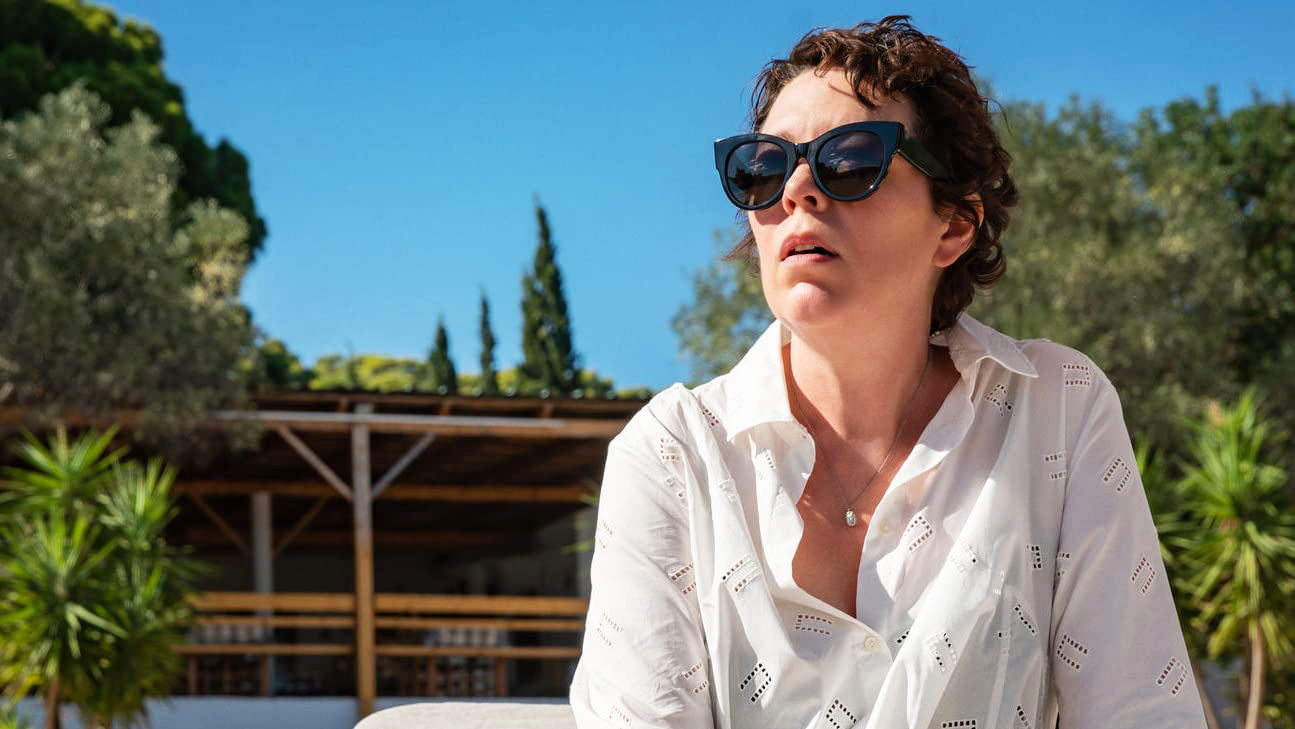
A still from The Lost Daughter, Maggie Gyellenhal's adaptation of Elena Ferrante’s novel by the same name.
Maggie Gyellenhal’s adaptation of Elena Ferrante’s novel The Lost Daughter shows how suffocating, draining and consuming motherhood can be
“The coarse language of the environment we came from was useful for attack or self defence, but, precisely because it was the language of violence, it hindered, rather than encouraged, intimate confidences,” wrote Elena Ferrante in Those Who Leave and Those Who Stay. The linguistic aspect which is one major chunk of their Neapolitan inheritance that Ferrante’s protagonists seek to escape from, and when they succeed in it, are haunted by the fear of being flung into it again, is something Leda is also not exempt from, except, it’s her daughters she fears will trudge the path backwards. But Maggie Gyllenhaal’s Leda is a British woman, shorn of her Neapolitan identity, a filmmaking decision to probably circumvent the language barriers. Yet, Leda fears that her husband will entrust her daughters to her mother, who she says did not even finish elementary school and that her abandoning them would hurl them into the same abyss she escaped from and yet she abandons them. Gyllenhaal’s immersive and discomfiting directorial debut, The Lost Daughter, an adaptation of the eponymous novel by Elena Ferrante, brings on screen a mother who has always existed but never been depicted, with such searing honesty that it stings. With closeup shots of a young Leda (played brilliantly by Jessie Buckley) peeling an orange with her daughters, materialise on screen flashbacks, the intensity of which one would feel in their bones, a tactility one doesn’t always experience in cinema.
“I’m working,” says her husband dismissively, Leda grunts, “I’m suffocating”, incandescent with frustration, in a flashback, as she (a professor of comparative literature) just cannot work peacefully because the daughters have created a ruckus. A divorced, middle aged Leda arrives at a small Greek town for a summer retreat. Her daughters, Bianca and Martha, now adults, have moved out and she can finally afford to go on a vacation where she does not have to bother about taking care of them. Instead, It turns out to be anything but the peaceful work vacation that it was supposed to be, rather becoming a psychological-emotional horror show. Reading her book on a sunny day by the beach, the idyll is almost intruded upon when an unruly American family, wealthy and powerful, arrives on the beach clamorously, first irritating and then captivating her. But it’s the mother daughter duo, a young and beautiful Nina inseparable from her daughter Elena who, in turn, is glued with her doll, that holds her attention. A child of three playing mother to her doll.
She observes them obsessively, a combination of nostalgic fascination, childish yearning and pangs of guilt induces in her a devastating turmoil. Memories from when her own daughters were young come rushing to her but it’s not the rose tinted nostalgia for what has conventionally been portrayed as the beautiful journey of being a mother. We see snippets of a young Leda with two small daughters demanding her constant attention, to play with one and to pacify the other crying raucously, to leave her work midway to attend to their frivolous demands and their urgent needs. In the novel, Ferrante writes, “As an adult I tried to keep in mind the misery of not being able to handle the hair, the face, the body of my mother. So when Bianca was a small child I patiently became her doll. I lay on the floor, let myself be cared for as if I were sick”. As her daughter plays with her, she, like a doll, looking lifeless, falls asleep on the floor strewn with toys, only to be woken up abruptly and painfully when Bianca, pretending to brush her hair, almost thrusts the comb in her scalp. In another instance, Bianca hits her playfully, and hits her repeatedly despite Leda’s persistent refusal. Frustrated, Leda hits her back and locks her in the hall, closing the door behind her so forcefully that the glass shatters.
Motherhood consumes Leda and drains her. The violence of her fading individuality melting into her daughters’ being and the subconscious struggle to retain it, comes to the fore sporadically but acquires the most grotesque form when Bianca first refuses to accept Leda’s childhood doll Mina (for Mini Mama) and later disfigures it with colouring and scribbling. Incensed, Leda flings it out of the window and watches it being dismembered with “a cruel joy” only to later realise that Bianca too was watching. She has become her daughter’s doll and now even her own childhood doll is not hers anymore, there’s no way out of this game of shifting identities she’s playing with herself, only transient outlets. The fleeting moment, sudden and impulsive, is pleasurable, because for those few seconds, when everything else seems to have come to a standstill, she is no longer a desolate doll, she feels life, the quiet violence of it only making it more delicious.
One day on the beach, Elena goes missing, throwing the whole family into a frenzy but Leda helps find her. Eventually the two women get to communicate with each other as Nina approaches Leda to thank her, and is absolutely beguiled by her, it shows in her eyes, as she lingers, wanting to talk to her, despite Elena’s relentless crying, for, she has lost her doll. In the next scene we get to know that nobody else but Leda has stolen the doll. If around two decades back the act of throwing her own doll down the window was that of reclaiming her own personhood, the impulsive decision to steal Elena’s doll is to retrieve the daughter in her, lost in “the crushing responsibility of motherhood”. But as she begins to take care of the doll, we realise that it is her motherhood she is redeeming.
Motherhood suddenly becomes guilt free. You clean the doll, change its clothes and shoes, make it vomit the dirt it has swallowed and then hide it in the kitchen cabinet as you go on to continue doing your research while soaking the sun. You don’t have to worry about it being hungry or hurt or longing to be with you while you are away working, your love is never not enough, you are not accused of discriminating by your children. “They resented the unfair distribution of not only obvious resemblances but of secret ones, those we become aware of later, the aura of bodies, the aura that stuns like a strong liquor. Barely perceptible tones of voice. A small gesture, a way of battling the eyelashes, a smile-sneer” Leda contemplates in the novel. Most of all, you are not expected to become a doll. “Bianca is like her father, she made me feel like she wanted to remake me. Like her viciousness was for my own good” Leda tells Will, an assistant at the resort, who Nina is having an affair with.
Talking about her daughters with Will, she says, “The bits that I find the most beautiful about them are the bits that are alien to me. So I don’t have to take responsibility for that.” One wonders if motherhood would have been different if Leda had sons instead of daughters. Would they have played mother to her while she was expected to become their doll? Would they have had the same complaints of not having passed on the very best of her looks, gestures and skills to them? Would they hold her responsible for not being beautiful, in the process making her feel ugly? Would she still feel that as she was getting older, the male gaze on the streets shifted from herself to her daughters, which gratified and unnerved her, both at once. “I wanted my daughters to be loved, I couldn’t bear them not to be, I was terrified of their possible unhappiness; but the gusts of sensuality they exhaled were violent, voracious, and I felt that the force of attraction of their bodies was as if subtracted from mine”, Leda ruminates in the novel. The daughters that came out of her body would make her worst fears come true, of becoming her mother, holding similar resentments to what she held against her mother. And yet, she would come back to them and stay.
Like so many other things in life of which women are supposed to be only passive receivers, abandonment is done to women, but whenever women are shown doing the abandoning, especially as mothers, from Kunti of Mahaharata who gave up her son to guard her honour to the typical Bollywood mother who had to part with her children to ensure their well-being, a higher moral ground attributed to their actions has always salvaged their motherhood. But the young Leda, walking out of that door, leaving behind two small daughters she loved and loved immensely, just not enough to lose herself, calls herself an “unnatural mother”, for how can a mother love herself more than her children. And yet she did, and “it felt amazing” as she tells Nina, tears incessantly rolling down her cheeks. When she first talked to Leda, Nina said to her, “when I saw you, I was like I wanna be like that lady” and now she’s afraid she might just become Leda. Yet, she’s in awe with her, a brilliant and beautiful woman, a rebel and it is with this reassurance that she asks Leda for her apartment’s keys so that she can consummate her affair with Will. “Perhaps she wanted me to refuse her the keys, so that she could refuse herself a dangerous outlet for her restlessness. Or she wanted me to give her the keys, so that she could feel in that gesture the authorization to take the risk of flight, the road to a future different from the one that was already written for her” Leda reflects in the novel.
She too has lost herself to what “became a sickness” for her mother and which “wouldn’t pass”, try as Nina may. Elena, Nina and Leda are all lost daughters, held together by Elena’s doll which Leda steals and Nina cannot find. Dolls and daughters, daughter and mothers, mothers and dolls, the boundaries are so blurred, one doesn’t even realise when she transitions into the other and when one does, it holds little meaning. The Lost Daughter has a constant sense of sinister to it and wears the look of a mystery, except that there’s no resolution in the end. We don’t get to see the grownup daughters nor hear their voices though Leda is shown talking to them on the phone on various occasions, this almost ghostly presence of her daughters accentuates the uncanny mood that prevails throughout the movie.
Collapsed on the shore, talking on the phone with her daughters and peeling snake like tendrils from an orange, Leda is at once, the daughter who cannot let her doll go, the mother she was afraid would brand her daughters and the doll she had to become for them.
More from Culture
Comments
*Comments will be moderated











